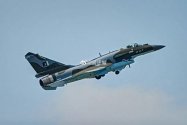You are using an out of date browser. It may not display this or other websites correctly.
You should upgrade or use an alternative browser.
You should upgrade or use an alternative browser.
Pakistan Military News, Reports, Data, etc.
- Thread starter A.Man
- Start date
Wow India was protesting Sri Lanka allowing Pakistan to dock that warship.
Now India looks like a complete dork.
"Sri Lanka belongs to India's sphere of influence"
Hy sir any info add on order of VT 4 tanks
On September 21, 2022, the Pakistan Navy's third Warship of the Milgem (Babur) class of air defense and guided missile heavy corvettes, PNS Khaibar (F-282) will be launched.
View attachment 95920
PS: Pic is few months old...
By the way ... finally, it can be revealed officially even if there won't be much fanfare this time due to the floods? Any more news about that one in green-grey? I heard those four delivered are again all grey only!
What's the scope for Pakistan and China to work together to oust Indian influence in Maldives?
There is an existing populist movement in Maldives against India (India Out campaign) and enhanced naval ties with Maldives would force India to spend more on the Indian Navy and diplomacy in a far corner. India provided a very loan interest $250 million loan to Maldives in $250 million during India Out unrest in 2020.
There is an existing populist movement in Maldives against India (India Out campaign) and enhanced naval ties with Maldives would force India to spend more on the Indian Navy and diplomacy in a far corner. India provided a very loan interest $250 million loan to Maldives in $250 million during India Out unrest in 2020.
I understand this is a provocative topic. It is not meant to be gratuitously provocative. I am raising this question with the long term prosperity and security of Pakistan in mind.
Does the military budget of Pakistan need to be reduced as a percentage of the overall budget for the sake of placing Pakistan on a sound economic footing?
The Pakistani economy has fallen behind the Indian economy in GDP per capita nominal.
2021
Pakistan: $1,538
India: $2,277
Pakistan and India were economically neck and neck 14 years ago.
2008
Pakistan: $991
India: $998
Military spending as a percentage of GDP is higher in Pakistan than compared to India or China. The figures below are from the Stockholm International Peace Research Institute and are estimates of military spending by SIPRI according to the think tank's methodology (not official figures).
2021
China: 1.7%
India: 2.7%
Pakistan: 3.8%
A good column in the Friday Times on the subject:
I don't think Pakistan needs to compromise its security by spending less on the military. Low cost and creative clandestine and diplomatic initiatives can keep India off balance and waste its military budget on diversions. For example, above I suggested gaining influence over Maldives. I assume if India spends an extra $20 billion on the Indian Navy over the next 10 years rather than use the same $20 billion on modernizing the Indian Army and Indian Air Force during the same period, it would have a net effect of enhancing the military balance in favor of Pakistan in most likely conflict scenarios. Khalistan secession (e.g. recent Sikh referendum in Brampton, Ontario) is gaining momentum and a brilliant example of Pakistani clandestine success.
Does the military budget of Pakistan need to be reduced as a percentage of the overall budget for the sake of placing Pakistan on a sound economic footing?
The Pakistani economy has fallen behind the Indian economy in GDP per capita nominal.
2021
Pakistan: $1,538
India: $2,277
Pakistan and India were economically neck and neck 14 years ago.
2008
Pakistan: $991
India: $998
Military spending as a percentage of GDP is higher in Pakistan than compared to India or China. The figures below are from the Stockholm International Peace Research Institute and are estimates of military spending by SIPRI according to the think tank's methodology (not official figures).
2021
China: 1.7%
India: 2.7%
Pakistan: 3.8%
A good column in the Friday Times on the subject:
The subject of Pakistan’s military spending has been in the news after the government increased the defence budget for the outgoing fiscal year by nearly 6% to “reportedly” over Rs1.45 trillion. Some analysts have compared this to India’s military spending and argued that it was “low”.
How does one determine whether a military budget is low or not too high? How does one evaluate? One must have a rational basis to make that statement. Do these analysts know the real defence budget including its tax implications? Do they know the opportunity cost of resources diverted to military enterprises at below-market prices?
I don't think Pakistan needs to compromise its security by spending less on the military. Low cost and creative clandestine and diplomatic initiatives can keep India off balance and waste its military budget on diversions. For example, above I suggested gaining influence over Maldives. I assume if India spends an extra $20 billion on the Indian Navy over the next 10 years rather than use the same $20 billion on modernizing the Indian Army and Indian Air Force during the same period, it would have a net effect of enhancing the military balance in favor of Pakistan in most likely conflict scenarios. Khalistan secession (e.g. recent Sikh referendum in Brampton, Ontario) is gaining momentum and a brilliant example of Pakistani clandestine success.
I understand this is a provocative topic. It is not meant to be gratuitously provocative. I am raising this question with the long term prosperity and security of Pakistan in mind.
Does the military budget of Pakistan need to be reduced as a percentage of the overall budget for the sake of placing Pakistan on a sound economic footing?
It's not a provocative question, it's been discussed on different threads.
The surface-level problem with the Pakistani military budget is that it focuses on manpower, which is cheap and easy to acquire, but costs a lot to maintain. Whereas a Tank/Gunship costs more up-front, but you don't have to pay for its kids medical expenses or give it a plot of land etc. The result is that you end up with an army that isn't capable of combined arms maneuver warfare, while also being very expensive, when all the costs are accounted for e.g. all the real-estate the Army has absorbed.
The actual (operational) problem is that Pakistani generals aren't that smart. They're actually idiots. And because they're only facing Indian generals, who are even bigger idiots, they never really had to come up with great solutions to complex problems. The result is that neither country can win a war decisively. They can both do defense (because defense doesn't require much operational skill) but brilliant offensives are beyond them. They don't even study these things properly. It's rote memorization in their officer schools, zero creative thought.
The strategic problem though, for Pakistan, is that we're the ones who need to get something from India i.e. Kashmir. That requires offense, which requires a LOT of skill (which our military doesn't have.) Offensive capability starts with doctrine+training, not equipment. You first have to be intellectually capable of offense, which Pakistan's military isn't. This is true of every branch, not just the Army. Even the PAF, which is more intellectually inclined and competent than the Army, focuses on DCA instead of OCA. Their max sortie rates are well below what they'd need for an offensive campaign etc.
Therefore, these problems exist at a deeper-level, and are ingrained in the Pakistani population, which overall, is just not very intelligent right now. We have a LOT of very dumb people doing a lot of very stupid things, at every level. Obviously, the military isn't going to be magically immune from a general lack of intelligence in society. If the society is dumb, it will produce dumb generals/air-chiefs who will create a dumb military. Our military likes to believe it is somehow magically smarter than civilians in Pakistan, but that was never the case. This 'martial magic' was just a story they told themselves, by sweeping all the contrary evidence under the rug, which is easy to do, because the civilians are equally dumb.
If the foundation of the problem is intelligence, then solving the problems should start with making people smarter. It will cost money which can be paid for by reducing the military budget.Therefore, these problems exist at a deeper-level, and are ingrained in the Pakistani population, which overall, is just not very intelligent right now.
If the military budget is reduced to 3% of GDP from 3.8% through deferral of equipment purchases and manpower cuts, it would save a few billion dollars in one year. That might be enough to fund the most basic intelligence boosting intervention possible: early childhood nutrition.
"Poor nutrition in the first 1,000 days can lead to stunting, and have irreversible development impacts on the child. Poor nutrition affects a child's health, brain development, school performance and future earnings." (World Food Programme)
Intelligence is the most important variable in soldier combat performance. The case could be made for reducing the military budget in favor of early childhood nutrition as essential to producing high quality soldiers and winning.
During the Korean and Vietnam Wars the Human Resources Research Organization (HumRRO) collected and analyzed soldier effectiveness data to identify the characteristics that differentiate the "fighter" from the "nonfighter" in combat (Egbert, et al., 1958). HumRRO found eleven characteristics that distinguished fighters from nonfighters; the first on the list was intelligence.
A problem with reducing the military budget, besides military objections, is the perception generated of a retreat. If Indians believe they have the initiative, it could lead to problems. So I think low cost and creative ideas in the clandestine and diplomatic realms would need to be joined at the hip to any reduction of the Pakistani military budget. If Pakistan can emerge as a successful disruptor in Maldives or convenor of the Khalistan movement it will neutralize any feeling of triumph of Indians in seeing lower Pakistani military spending.



